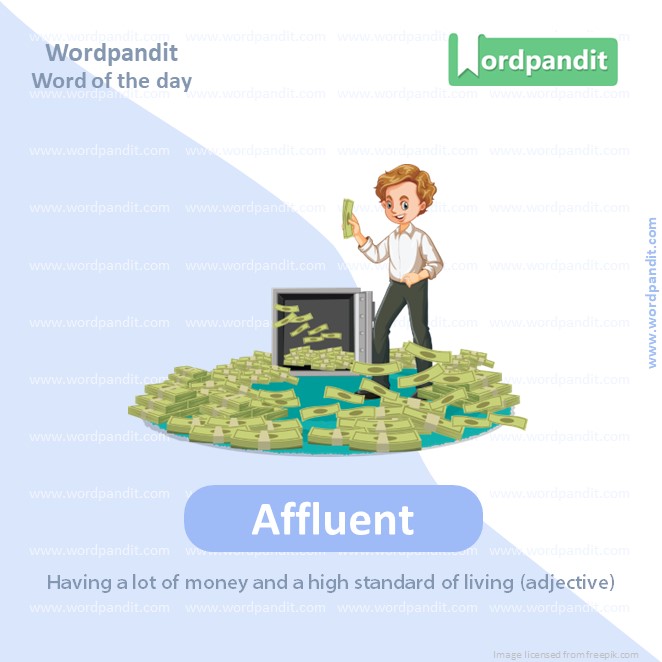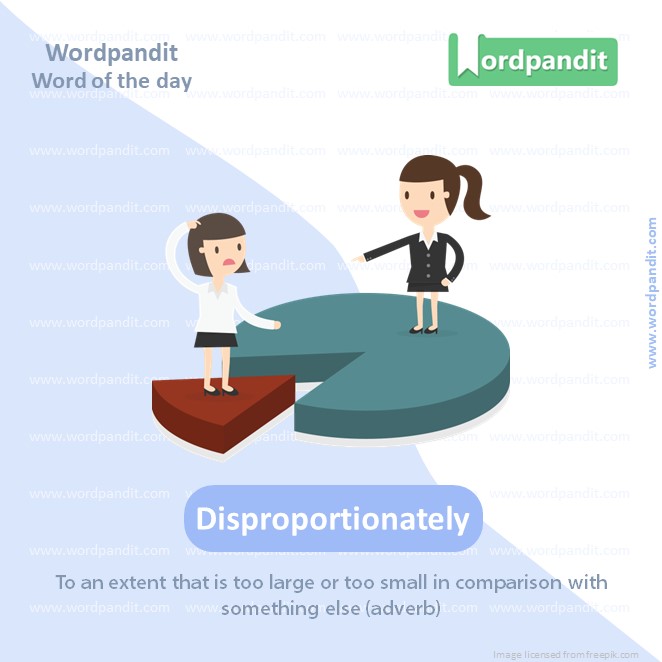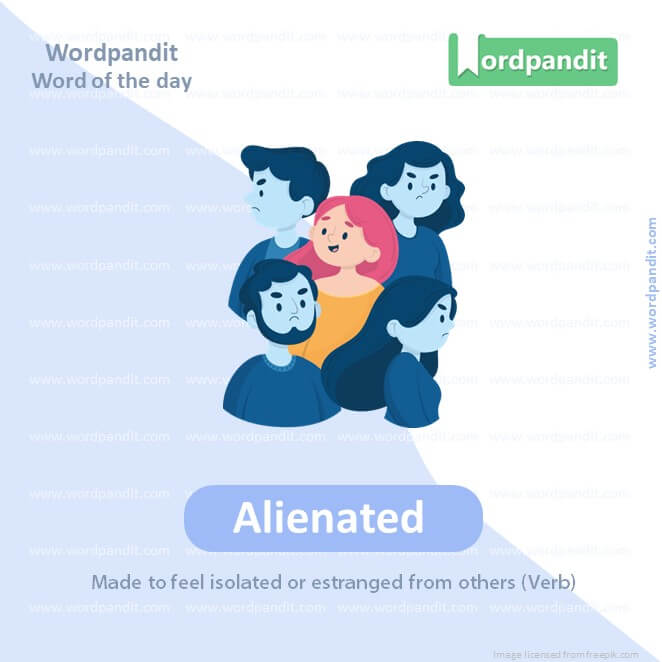Daily Vocabulary Words: List of Daily Used Words in Leading International Newspapers
Hi there. Welcome to this special section @ Wordpandit.
Our endeavour here is very simple: to highlight important daily vocabulary words, which you would come across in leading newspapers in the country. We have included the following newspapers in our selection:
• The New York Times
• The Washington Post
• Scientific American
• BBC
• The Guardian
• Psychology Today
• Wall Street Journal
• The Economist
We are putting in extensive work for developing your vocabulary. All you have got to do is be regular with this section and check out this post on a daily basis. This is your repository of words that are commonly used and essentially, we are posting a list of daily used words. Hence, this has significant practical application as it teaches you words that are used commonly in leading publications mentioned above.
Visit the website daily to learn words from leading international newspapers.

WORD-1: Affluent
CONTEXT: the term as “ideas and opinions that confer status on the affluent while often inflicting costs on the lower classes.
SOURCE: New York times
Explanatory Paragraph: Imagine living in a big, beautiful house with lots of toys and going on vacation anytime you want. “Affluent” describes people who have a lot of money and can buy whatever they like, like having endless ice cream without worrying about it running out.
Meaning: Having a lot of money and a high standard of living (adjective).
Pronunciation: AF-loo-ent
Synonyms: Wealthy, rich, prosperous, well-off, opulent, well-to-do
Usage Examples:
1. They live in an affluent neighborhood.
2. Affluent families often donate to charities.
3. The city is known for its affluent residents.
4. He comes from an affluent background.
WORD-2: Extolling
CONTEXT: the value of marriage as an institution but who stop short of extolling “the ideal of the two-parent family.”
SOURCE: New York times
Explanatory Paragraph: Imagine telling everyone how amazing your best friend is because they always share their snacks with you. “Extolling” is like that; it’s when you talk about someone or something in a very positive way, saying they are really great, like a superhero.
Meaning: Praising highly (verb).
Pronunciation: ex-TOLL-ing
Synonyms: Praising, lauding, acclaiming, glorifying, celebrating, applauding
Usage Examples:
1. The teacher was extolling the student’s efforts.
2. He kept extolling the benefits of exercise.
3. Critics are extolling her latest book.
4. She extolled his generosity to everyone.

WORD-3: Outmoded
CONTEXT: I don’t doubt that Henderson heard these marriage-is-outmoded beliefs expressed by his Yale peers.
SOURCE: New York times
Explanatory Paragraph: Imagine wearing clothes that were popular a long time ago, like a big, poofy dress from 100 years ago, to school today. “Outmoded” means something is old-fashioned and not used anymore, like a really old phone that can’t even play games or go on the internet.
Meaning: No longer fashionable or useful (adjective).
Pronunciation: out-MOHD-ed
Synonyms: Outdated, obsolete, old-fashioned, antiquated, passé, unfashionable
Usage Examples:
1. The outmoded computer couldn’t run new software.
2. Those ideas are now considered outmoded.
3. Outmoded technology was replaced with modern equipment.
4. She prefers outmoded styles for their charm.
WORD-4: Cohabitation
CONTEXT: the number of Americans who said that single motherhood and unmarried cohabitation were bad for society increased by several percentage points from 2018 to 2021.
SOURCE: New York times
Explanatory Paragraph: Imagine if you and your best friend decided to build a huge fort and then live in it together, sharing everything inside it. “Cohabitation” is when people live together in the same home and share their daily lives, kind of like having a sleepover that never ends.
Meaning: Living together and having a sexual relationship without being married (noun).
Pronunciation: koh-hab-i-TAY-shun
Synonyms: Living together, coexistence, sharing a home, domestic partnership, joint habitation
Usage Examples:
1. Cohabitation before marriage is common in many countries.
2. The study examines the effects of cohabitation on relationships.
3. They chose cohabitation over marriage.
4. Laws regarding cohabitation vary by country.

WORD-5: Disproportionately
CONTEXT: I’ve also heard the argument that the beliefs of elite college students carry outsize influence because they will disproportionately be leading the country someday.
SOURCE: New York times
Explanatory Paragraph: Imagine if you had a tiny cupcake and your friend had a huge cake just for themselves. That wouldn’t be fair, right? “Disproportionately” means something is a lot bigger, smaller, more, or less than it should be compared to something else, like sharing snacks unevenly.
Meaning: To an extent that is too large or too small in comparison with something else (adverb).
Pronunciation: dis-pro-POR-shun-it-lee
Synonyms: Excessively, overly, unduly, inordinately, unreasonably, unevenly
Usage Examples:
1. The burden of taxes fell disproportionately on the poor.
2. She was disproportionately rewarded for her contribution.
3. Resources are disproportionately allocated to certain areas.
4. The punishment was seen as disproportionately severe.

WORD-6: Infighting
CONTEXT: All the elite infighting in the world won’t change the fact that a good man is increasingly hard to find.”
SOURCE: New York times
Explanatory Paragraph: Imagine a group of friends arguing over which game to play, and they can’t decide because everyone wants something different. “Infighting” is when people within the same group argue or fight among themselves, like siblings fighting over toys.
Meaning: Conflict or rivalry among members of the same group or organization (noun).
Pronunciation: IN-fight-ing
Synonyms: Discord, strife, squabbling, bickering, rivalry, factionalism
Usage Examples:
1. Infighting within the party is affecting its unity.
2. The company’s progress was hampered by infighting.
3. Infighting among team members led to delays.
4. To avoid infighting, they agreed on a mediator.
WORD-7: Stigmatized
CONTEXT: After World War II, when marriage rates were peaking, divorces were hard to come by and heavily stigmatized, and shotgun marriages were far more common.
SOURCE: New York times
Explanatory Paragraph: Imagine if someone made fun of another person for having a unique laugh, making them feel bad or embarrassed about it. “Stigmatized” means to treat someone or something as if they’re wrong or bad just because they’re different or made a mistake, like saying it’s not okay to be unique.
Meaning: Branded or marked as disgraceful or unworthy (verb, past tense).
Pronunciation: STIG-muh-tized
Synonyms: Disgraced, shamed, branded, discredited, condemned, denigrated
Usage Examples:
1. People with mental health issues are often stigmatized.
2. The disease was once highly stigmatized.
3. He felt stigmatized by his past mistakes.
4. Efforts are being made to destigmatize the condition.
WORD-8: Impediments
CONTEXT: Conservatives often think that following the success sequence is only about the individual, but in that article, the historian Stephanie Coontz outlined several “well-known impediments to following the sequence”:
SOURCE: New York times
Explanatory Paragraph: Imagine trying to run really fast in a race, but you have to wear a heavy backpack. That backpack makes it hard to run; it’s like an “impediment”. An “impediment” is something that makes it difficult to do something, like a hurdle you have to jump over in a race.
Meaning: Obstacles that hinder or prevent progress (noun).
Pronunciation: im-PEED-uh-ments
Synonyms: Obstacles, barriers, hurdles, obstructions, hindrances, constraints
Usage Examples:
1. Financial impediments made it hard to start the business.
2. Physical impediments can be overcome with determination.
3. The new law removed several legal impediments.
4. He faced many impediments in his research.
WORD-9: Iteration
CONTEXT: This is all, of course, a new iteration of an old argument.
SOURCE: New york times
Explanatory Paragraph: Imagine drawing a picture of a house, and then drawing it again to make it even better, adding more details each time. “Iteration” is when you repeat something over and over, making little changes to improve it, like trying to perfect a dance move by practicing it many times.
Meaning: The process of doing something again and again, usually to improve it (noun).
Pronunciation: it-uh-RAY-shun
Synonyms: Repetition, version, cycle, recurrence, redo, repetition
Usage Examples:
1. Each iteration of the software added new features.
2. The design went through several iterations before approval.
3. Iteration is key to developing a successful project.
4. The latest iteration of the phone is thinner and lighter.

WORD-10 Alienated
CONTEXT The pandemic ended; we went on with our lives. Yet by considerable margins, people still say they feel alienated, vulnerable, unsafe.
SOURCE: New York times
Explanatory Paragraph: Imagine if your friends started playing a game without inviting you, and you felt left out and sad. “Alienated” means feeling separated or left out from a group or place where you used to belong, like being the only one not invited to a party.
Meaning: Made to feel isolated or estranged from others (Verb).
Pronunciation: AY-lee-uh-nay-tid
Synonyms: Estranged, isolated, distanced, detached, disconnected, excluded
Usage Examples:
1. He felt alienated from the group.
2. The new policy alienated many of its supporters.
3. She was alienated by their lack of understanding.
4. Efforts to integrate were made after realizing some members felt alienated.
vocabulary 10 words
Expanding your lexicon but don’t know where to start? There’s an efficient approach that may just be the solution you’ve been seeking: focusing on vocabulary 10 words at a time. This method is known for its simplicity and efficacy, giving learners manageable and meaningful chunks of new knowledge to digest.
Let us delve into how to adapt the ‘vocabulary 10 words’ approach to your language learning routine. This strategy is quite straightforward: instead of attempting to learn dozens of words all at once, break your learning down into smaller steps. Take sets of vocabulary 10 words at a time. This not only makes the process less daunting but also allows for more focus and better retention.
Make your ‘vocabulary 10 words’ as diverse as possible. In these sets, include nouns, verbs, adjectives, and adverbs from different contexts. Creating variety within your selected vocabulary 10 words guarantees exposure to a range of language nuances while promoting a balanced growth of your verbal arsenal.
Afterward, engage with your chosen ‘vocabulary 10 words’ in different ways. Use them in written sentences, practice their pronunciation, or play word games. Interacting with these words in various forms reinforces their meaning and usage, ensuring that they stick in your memory.
At the end of each week, review your vocabulary 10 words. Recollection is vital in language acquisition, and revisiting these words will help cement them in your mind. Make this a regular practice for long-term retention and recall.
In conclusion, the ‘vocabulary 10 words’ tactic is not just about learning new terms. It boasts a targeted, balanced, and powerful approach to broadening one’s vocabulary. Not to mention, it fosters a manageable and enjoyable routine for learners of any language. Adopt the ‘vocabulary 10 words’ method and witness a considerable difference in your language proficiency.











